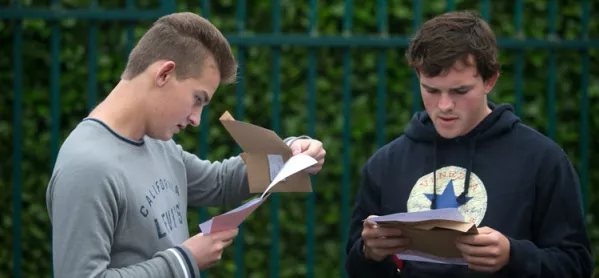- Home
- Pupils could miss out on GCSE resits
Pupils could miss out on GCSE resits

Pupils could be denied the opportunity to resit some of next year’s GCSEs under plans from the exams watchdog Ofqual.
The regulator has announced that exam boards will not have to offer resits to the final group of pupils to take GCSEs graded A* to G - except in English, maths and science where pupils will be guaranteed a chance to retake the old exams.
New GCSEs graded 9 to 1, which have been explicitly designed to be tougher than their predecessors, will be introduced over a three-year period starting next summer. Without the resit opportunities, pupils wanting a second chance at the paper would have to learn the new content and take the new versions of the exams.
Ofqual had initially proposed that there would be no resits at all, except in English and maths. But after respondents to a consultation raised concerns, it has decided that boards will have to offer science resits. It has also decided to give exam boards the freedom to choose whether to allow resits in other GCSE subjects.
A report from the regulator said concerns had been raised about dropping science resits because courses such as teacher training, nursing and midwifery required a grade C in GCSE science.
The report said very small numbers of pupils took resits in subjects other than English, maths and science. It said: “These subjects are not normally specifically required for progression… Outside the subjects for which we have required resits, we estimate the number of students that normally resit [is] not higher in any subject than about 200 students per year.”
‘Issues with timetabling’
It said some respondents to its consultation had said resits in subjects other than English, maths and science would be expensive for exam boards to provide and would “create issues with timetabling and make setting appropriate standards difficult”.
It said: “Given this, we have concluded that there are no other subjects, in addition to those noted above, for which we will require exam boards to provide a resit opportunity.”
Ofqual’s report said it recognised that boards’ fees for resits “might be higher than [fees] for current qualifications”.
The report said:
- New English and maths GCSEs will be taken for the first time in 2017. Pupils taking the old versions for the last time, this summer, will be able to resit them in November. They will be given a second resit chance in May or June 2017, as long as they will be aged 16 or over on 31 August this year. The government expects pupils to retake English and maths GCSEs after they leave secondary school if they do not achieve a grade C;
- Students taking the final versions of the old science GCSE exam, in 2018, will be able to resit GCSEs in science and additional science using the old format - but exam boards will not have to offer resits in physics, chemistry and biology separately. Pupils who originally took separate sciences will be allowed to take resits in science and additional science;
- Students taking the final versions of old GCSEs in other subjects - some in 2017 and some in 2018 - will only be able to retake them if their exam board chooses to offer a resit. Boards will not have to do so;
- Students taking old AS and A-levels in all subjects will be able to resit the paper in May or June the following year.
Malcolm Trobe, interim general secretary of the Association of School and College Leaders union, told TES that pupils who missed exams because of illness or injury would be the worst-affected if GCSE resits were not available in most subjects.
“It’s rare that anybody would resit a GCSE in history, geography or music [to improve their grade], because youngsters tend to move on to the next stage of their qualifications or training after GCSEs,” he said.
“But my concern is for pupils who miss their exams because they become ill or are injured during Year 11. They have a big potential problem because they will be faced with new GCSEs with a completely new syllabus when they’ve done a year or more of the old syllabus.
“It would be helpful to have a constructive discussion about how youngsters affected by a serious illness, which means they are unable to take their examinations, can be enabled to progress to the next stage of their education or training.”
Want to keep up with the latest education news and opinion? Follow TES on Twitter and like TES on Facebook
Keep reading for just £1 per month
You've reached your limit of free articles this month. Subscribe for £1 per month for three months and get:
- Unlimited access to all Tes magazine content
- Exclusive subscriber-only stories
- Award-winning email newsletters



